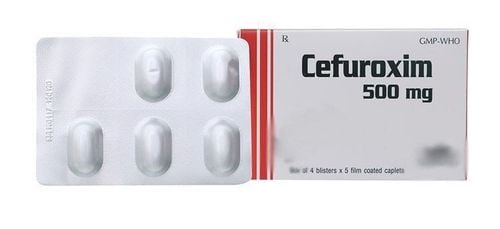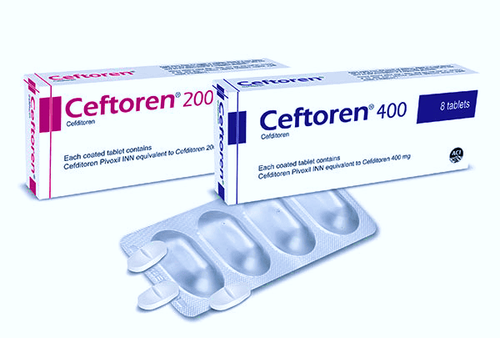This is an automatically translated article.
Cephalothin is an antibiotic with anti-bacterial, antifungal, antiviral, and anti-parasitic effects. The drug is indicated in the treatment of bacterial infections such as pyelonephritis, endocarditis, osteomyelitis, urinary tract infections, surgical infections, cystitis,... So the use of cephalothin is what?
1. What are the effects of Cephalothin 2 grams?
Cephalothin is an antibiotic with anti-infective, antifungal, antiviral and anti-parasitic effects with the main ingredient being cephalothin in the form of cephalothin sodium with a content of 2 grams. It is considered a second-choice drug for the treatment of complicated infections, often used as an alternative to penicillin, in infections caused by susceptible gram-positive bacilli and gram-positive cocci.
2. Indications and contraindications
2.1 Indications for the use of cephalothin Indications for the use of cephalothin in the following cases:
Bacteremia, endocarditis, osteomyelitis, bone marrow infection Complicated urinary tract infections such as acute or chronic pyelonephritis Inflammation recurrent bladder infections Respiratory tract infections such as severe bacterial pneumonia, lung abscesses, bronchopneumonia Surgical infections such as peritoneal abscesses, abdominal abscesses, postoperative infections Severe intestinal infections Inflammation pleural effusion Besides the above uses, cephalothin may also be used to treat some other conditions that are not listed above. Therefore, consult your doctor before taking the drug for advice on how to use the drug effectively.
2.2 Contraindications to the use of cephalothin The use of cephalothin is contraindicated in patients with a history of allergy to cephalosporin antibiotics or any of its ingredients.
3. How to use and dosage of cephalothin 2 grams
Cephalothin is prepared as a drug for injection, so the drug is administered intramuscularly or intravenously. Dosage of cephalothin will depend on the medical condition and age of the patient. The recommended dose is 0.5 - 1 gram every 4-6 hours, administered by slow intravenous injection over 3-5 minutes. For severe infections use doses up to 12 grams/day.
Use cephalothin regularly to get the most benefit from it. To use the medicine safely, take cephalothin exactly as directed by your doctor, do not use more, smaller or longer than prescribed. Absolutely do not arbitrarily increase the dose of the drug or abuse the drug for too long for a long time. Because this not only makes your condition worse, but also increases the risk of unwanted effects.
4. Undesirable effects when using cephalothin 2 grams
Some unwanted effects that may occur when using cephalothin include:
Pain at the injection site Diarrhea Eosinophilia, bleeding complications Skin rash, Fever, Urticaria, Neutropenia Thrombocytopenia Hemolytic anemia Pseudomembranous colitis Nausea, vomiting Nephrotoxicity with transient elevation of blood urea and creatinine Interstitial nephritis Interstitial nephritis Cholestatic jaundice Increased GOT, GPT Arthritis pain Candidiasis Neurotoxicity CNS, convulsions may occur in patients treated with high doses, especially patients with renal failure, thrombophlebitis after infusion. Before prescribing a medication, doctors always weigh the benefits and effects of cephalothin more than the risk of side effects. However, some cases when taking cephalothin can still occur unwanted effects. Therefore, when there are unusual signs after taking the drug, especially when a severe allergic reaction is accompanied by signs such as severe dizziness; shortness of breath; swelling of the face, throat and tongue; rash or itching,... In this case, the patient or family member should immediately notify the medical staff for immediate treatment.
5. Some notes when using cephalothin 2 grams
Some notes when using cephalothin include:
Inform your doctor about any history of hypersensitivity, allergy to cephalothin or any other allergies. Cephalothin may contain inactive ingredients and could cause an allergic reaction or other serious problems. Report any medications you are taking including prescription drugs, over-the-counter medicines, herbs and supplements, foods, preservatives or dyes. Use with caution in patients who are allergic to beta-lactam antibiotics, penicillin, patients with renal failure,... Therefore, it is necessary to pay special attention to monitoring renal function, blood clotting time, especially during pregnancy. long-term treatment with high doses of cephalothin. During treatment with cephalothin, some tests should be carried out because cephalothin may interfere with the measurement of creatinine by the jaffe method. For pregnant women, cephalothin can be used at any stage of pregnancy and is generally considered safe during pregnancy, with no reported association between cephalothin treatment and the condition. birth defects or neonatal toxicity. For nursing women: Cephalothin drugs can be excreted in breast milk at low concentrations and have no effect on breastfed infants, but special attention should be paid to children with rash, diarrhea,... Treatment Long-term use of cephalothin can cause overgrowth of non-susceptible bacteria, so it is necessary to carefully monitor the patient, if superinfection, the drug should be stopped. Conduct culture and susceptibility testing of bacteria before and during treatment. Pseudomembranous colitis may occur with the use of broad-spectrum antibiotics. Therefore, special attention should be paid to patients presenting with severe diarrhea during treatment with cephalothin. If you forget to take a dose of medicine, you should notify your healthcare provider immediately so that the missed dose can be replenished as soon as possible. Do not arbitrarily use the drug twice the dose more than the treatment regimen. Using an overdose of cephalothin can cause serious symptoms such as nausea, vomiting, abdominal pain, weakness,...
6. Drug interactions
Drug interactions may reduce the effect of cephalothin, or increase the effect of unwanted effects. Tell your doctor about all other medicines you are taking including vitamins, prescription drugs, over-the-counter medicines, and other herbal products. Do not stop, start, or change the dose of any medicine without your doctor's consent.
Some drugs that may interact with cephalothin include:
Nephrotoxic drugs such as aminoglycoside antibiotics may increase the risk of kidney damage Diuretics such as furosemide: some evidence suggests that furosemide increases the risk of kidney damage. toxicity when co-administered with cephalothin. Probenecid: inhibits renal excretion of cephalothin.
7. How to store cephalothin 2 grams?
Cephalothin medicines are stored in a medical facility at room temperature, protected from light and away from moisture. Do not store cephalothin in a humid place or in the freezer. For the reconstituted solution, it is stable for 12-24 hours at room temperature and can be used for 96 hours if stored in the refrigerator. Different medicines will have different storage methods, so read the cephalothin storage instructions on the package carefully, or ask your pharmacist. Keep cephalothin out of the reach of children and family pets. When the medicine has expired or has been damaged and cannot be used anymore, dispose of the medicine according to the correct procedure. Do not arbitrarily dispose of cephalothin into the environment such as a water pipe or toilet unless requested. Consult your waste disposal company or pharmacist for advice on how to safely dispose of cephalothin to help protect the environment. In summary, cephalothin is an antibiotic with anti-bacterial, antifungal, antiviral, and anti-parasitic effects indicated in the treatment of infectious conditions such as pyelonephritis, endocarditis, inflammation of the lining of the heart. bone, urinary tract infections, surgical infections, cystitis, etc. However, cephalothin can cause some unwanted effects and drug interactions, so tell your doctor what kind of medicine to take. medications you are taking to reduce the risk of unwanted effects and at the same time increase the effectiveness of the treatment process.
Please dial HOTLINE for more information or register for an appointment HERE. Download MyVinmec app to make appointments faster and to manage your bookings easily.













